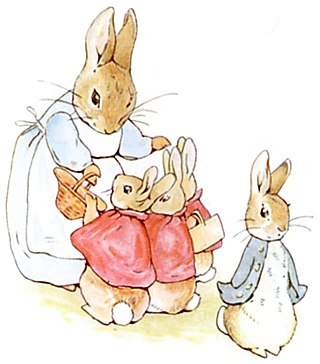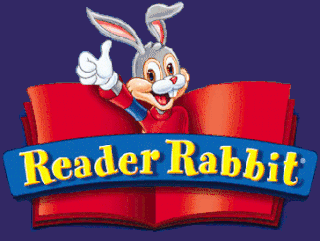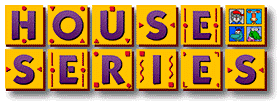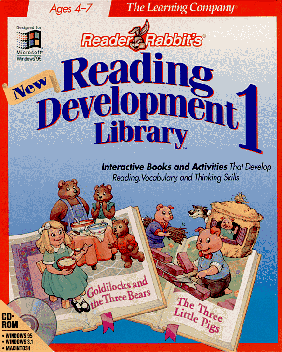Related Research Articles

A picture book combines visual and verbal narratives in a book format, most often aimed at young children. With the narrative told primarily through text, they are distinct from comics, which do so primarily through sequential images.
Electronic literature or digital literature is a genre of literature where digital capabilities such as interactivity, multimodality or algorithmic text generation are used aesthetically. Works of electronic literature are usually intended to be read on digital devices, such as computers, tablets, and mobile phones. They cannot be easily printed, or cannot be printed at all, because elements crucial to the work cannot be carried over onto a printed version.

Living Books is a series of interactive read-along adventures aimed at children aged 3–9. Created by Mark Schlichting, the series was mostly developed by Living Books for CD-ROM and published by Broderbund for Mac OS and Microsoft Windows. Two decades after the original release, the series was re-released by Wanderful Interactive Storybooks for iOS and Android.

Reader Rabbit is an educational video game franchise created in 1984 by The Learning Company. The series is aimed at children from infancy to the age of nine. In 1998, a spiritual successor series called The ClueFinders was released for older students aged seven to twelve.

Arthur's Teacher Trouble is a book in the Arthur series, released in 1986. It was written by Marc Brown and published by Little, Brown and Company and The Living Books Company.
Mark Schlichting is a publisher, author, and digital pioneer of children's multimedia and interactive design software. He is best known as the creator and subsequent Design and Art Director of Broderbund's Living Books series including the original 1994 Living Books PC game Harry and the Haunted House, one of the first lines of children's interactive book software on CD-ROM. Schlichting was Design and Art Director for Living Book's first interactive CD-ROM book adaptation, Mercer Mayer’s Just Grandma and Me, which was one of the first software titles accredited as a school textbook and used as a product demonstration by Apple CEO John Sculley.
The Magic School Bus is a series of educational software video games developed by Music Pen and published by Microsoft via their Microsoft Home brand. The interactive adventures are part of the larger franchise and based with The Magic School Bus original series books and public television series.

Wanderful Interactive Storybooks is a developer of interactive storybook apps based on the titles originally published as Living Books by Broderbund Software.

Disney's Animated Storybook is a point-and-click adventure interactive storybook video game series based on Walt Disney feature animations and Pixar films that were released throughout the 1990s. They were published by Disney Interactive for personal computers for children ages four to eight years old. Starting from 1994, most of the entries in the series were developed by Media Station. They have the same plots as their respective films, though abridged due to the limited medium.

Chop Suey is a point-and-click adventure game developed and published by Magnet Interactive Studios for the Macintosh in 1995. It was developed by Theresa Duncan and Monica Gesue to be a story disc for girls. Art is by Ian Svenonius, music and sound is by Brendan Canty, and narration is by author David Sedaris.

Early Learning House or simply the House Series is a collection of four main educational video games and two compilations for the Windows and Macintosh platforms, developed by Theatrix Interactive, Inc. and published by Edmark software. Each different game focuses on a particular major learning category with selectable skill settings for preschooler, kindergarten and elementary learners. Millie's Math House (1992) on mathematics, Bailey's Book House (1993) on language, Sammy's Science House (1994) on science, and Trudy's Time and Place House (1995) on history and geography. A spin-off, Stanley's Sticker Stories (1996), sees players create animated storybooks with the series' characters. Millie & Bailey Preschool and Millie & Bailey Kindergarten each contain the combined activities from two of the four software products. In addition the programs can be configured by an adult mode to suit students with special needs. Most of the activities in every game have two modes, one to allow learners to explore and try it out for themselves and the other for learners to follow specific tasks set by the game characters. Learners also have the option to print pictures of creative activities and record sounds in phonics activities. Later the games were re-developed by Houghton Mifflin Harcourt Learning Technology and re-published by The Learning Company with newer graphics and additional activities.
Madeline is a series of educational point-and-click adventure video games which were developed during the mid-1990s for Windows and Mac systems. The games are an extension of the Madeline series of children's books by Ludwig Bemelmans, which describe the adventures of a young French girl. The video-game series was produced concurrently with a TV series of the same name, with characters and voice actors from the show.
The Arthur video games franchise was a series of learning and interactive story video games based on the American-Canadian children's TV show Arthur. The games were released in the 1990s and 2000s for PlayStation and Game Boy Color alongside Windows and Mac OS computers.
Magic Tales is a series of interactive storybooks for children, developed by Animation Magic and produced by Davidson, which were distributed by Capitol Multimedia, Inc. on CD-ROM for Mac OS and Microsoft Windows. The series was introduced at the 1995 MacWorld trade show. The series began with the release of The Little Samurai in 1995. The stories are narrated by the central character Grandpa Mouse, who reads them to his two grandchildren while they are having a boring time. The series was titled "El Abuelo Ratón" in Spanish. Each story has twelve pages.

Reader Rabbit's Reading Development Library is a series of four edutainment games from The Learning Company as part of the Reader Rabbit franchise. The first two games were developed in October 1994, the third was developed in 1995 and the last one was developed in 1996. The products make use of interactive storybooks based on fairy tales to help early readers broaden their reading, vocabulary, writing and word recognition skills. Each number in the title corresponds to the reading level of the reader they are aimed at.

Reader Rabbit's Interactive Reading Journey is a 1994 video game released on the Windows and Macintosh systems. It is the sixth game in the Reader Rabbit franchise. Designed for ages 4 till 7, the game introduces the new main characters Mat the Mouse and Sam the Lion who accompany Reader. It was then re-released in 1997 under the title "Reader Rabbit's Interactive Reading Journey For Grades K-1", followed by another in 1998 titled "Reader Rabbit's Reading Ages 4–6" and a personalized version in 1999.

Magic Fairy Tales: Barbie as Rapunzel is a 1997 educational adventure game developed by Media Station and published by Mattel Media.

Europress Bookshelf is a series of interactive storybooks for children, developed by Europress Software and published by Q Range on CD-ROM for Mac OS and Windows, using their own games creator Klik & Play to produce the products with minimal programming. The games came under three series including "Read & Play" for younger readers, "Topsy and Tim" based on the Adamson books and "Living Classics".
Discis Knowledge Research is a company, founded in Toronto in 1988, that acquired rights to children's stories and published them as CD-ROM-based interactive children's books.
References
- 1 2 Beaty, Janice J. (2013-01-01). Preschool Appropriate Practices: Environment, Curriculum, and Development. Cengage Learning. ISBN 978-1-285-49995-6.
- ↑ "Kids will love ROMping through these stories". Tampa Bay Times. Retrieved 2020-10-28.
- ↑ Diegmueller, Karen (1995-05-03). "'Talking Books' Pressed Into Classroom Service - Education Week". Education Week. Retrieved 2020-10-30.
- 1 2 http://pdf.textfiles.com/zines/CGW/1992_07_issue96.pdf [ bare URL PDF ]
- ↑ "Literature and CD-ROM: Strange Bedfellows or the Marriage of True Minds?" by Griffin, J. R. - Computers in Libraries, Vol. 16, Issue 5, May 1996". Archived from the original on 2020-10-31.
- ↑ Says, Adidas Zx Flux Sizing Review. "What (exactly) is an App? | Children's Technology Review". Archived from the original on 2020-06-20. Retrieved 2020-11-01.
- ↑ Lefever-Davis, Shirley, and Cathy Pearman. "Early readers and electronic texts: CD-ROM storybook features that influence reading behaviors." The Reading Teacher 58.5 (Feb 2005): 446-9.